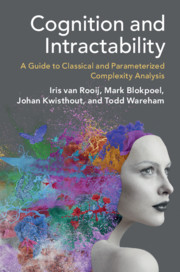Book contents
- Frontmatter
- Contents
- List of Figures
- List of Tables
- Preface
- Part I Introduction
- Part II Concepts and Techniques
- 2 Polynomial versus Exponential Time
- 3 Polynomial-Time Reductions
- 4 Classical Complexity Classes
- 5 Fixed-Parameter Tractable Time
- 6 Parameterized Reductions
- 7 Parameterized Complexity Classes
- Part III Reflections and Elaborations
- Part IV Applications
- Appendix A Mathematical Background
- Appendix B List of Computational Problems
- Appendix C Compendium of Complexity Results
- References
- Index
7 - Parameterized Complexity Classes
from Part II - Concepts and Techniques
Published online by Cambridge University Press: 18 April 2019
- Frontmatter
- Contents
- List of Figures
- List of Tables
- Preface
- Part I Introduction
- Part II Concepts and Techniques
- 2 Polynomial versus Exponential Time
- 3 Polynomial-Time Reductions
- 4 Classical Complexity Classes
- 5 Fixed-Parameter Tractable Time
- 6 Parameterized Reductions
- 7 Parameterized Complexity Classes
- Part III Reflections and Elaborations
- Part IV Applications
- Appendix A Mathematical Background
- Appendix B List of Computational Problems
- Appendix C Compendium of Complexity Results
- References
- Index
Summary
In this chapter we introduce the parameterized analogues of \pt\ and \np, namely, \fpt and other complexity classes such as \wone, \wtwo, and \xp\ comprising with \fpt\ the \whi-hierarchy, and the formal notions of \whi-hardness and \whi-completeness. We describe why \whi-hard parameterized problems are considered to be fixed-parameter intractable (i.e., not computable in fixed-parameter tractable time). We explain how one can prove that a problem is a member of a class in the \whi-hierarchy, and how one can use the technique of parameterized reduction, introduced and practiced in Chapter 6, to prove \whi-hardness and \whi-completeness.
Information
- Type
- Chapter
- Information
- Cognition and IntractabilityA Guide to Classical and Parameterized Complexity Analysis, pp. 148 - 164Publisher: Cambridge University PressPrint publication year: 2019
